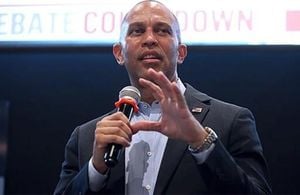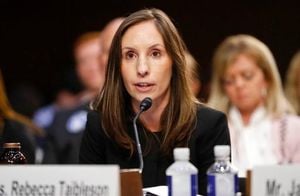On August 15, 2025, the Texas Education Agency (TEA) unveiled its latest accountability ratings for public school systems and campuses across the state, marking the first comprehensive assessment since the COVID-19 pandemic upended education. The release, which covers both 2024 and 2025 ratings, comes after a protracted legal battle and at a time when Texas is poised to channel unprecedented sums of taxpayer money into private education through a controversial new voucher program. These dual developments are sparking fierce debate about transparency, oversight, and the future of education in the Lone Star State.
According to KVII, the TEA rated 1,208 districts and 9,084 campuses statewide, providing a detailed snapshot of how each school is faring. The data shows that 24 percent of districts and 31 percent of campuses improved their ratings, while 15 percent of campuses saw a decline. Amarillo ISD, for instance, held steady with an overall B rating, even nudging its score up from 82 to 83 out of 100. Canyon ISD also maintained its B rating, improving from 86 to 88. These incremental gains are being welcomed by local leaders, especially after years of uncertainty and the looming threat of state intervention for persistently low scores.
The A–F accountability system, established by the 85th Texas Legislature in 2017 through House Bill 22, evaluates schools in three key areas: Student Achievement, School Progress, and Closing the Gaps. While the methodology remained largely unchanged for several years, the 2022-23 school year saw updates intended to more accurately reflect performance. The result, TEA officials say, is a clearer, more consistent picture of how schools are doing—and where they need to improve.
But as public schools face ever-stricter scrutiny, a parallel story is unfolding in the private sector. On August 16, 2025, The Economic Times reported that Texas private schools are preparing to receive $1 billion in taxpayer funding through a new voucher program set to launch in the 2026-27 school year. Governor Greg Abbott signed legislation authorizing this massive investment, touting it as a way to expand parental choice. Yet the program imposes only minimal accountability measures on private schools, a stark contrast to the rigorous oversight applied to public institutions.
Investigations by ProPublica and The Texas Tribune have uncovered a pattern of nepotism and self-dealing in some Texas private schools—practices that would be illegal in public or charter schools but remain permissible for private ones. For example, a Houston private school has appointed only married couples to its governing board for eight years, while two Dallas private schools awarded more than $7 million in contracts to their own board members. In another case, seven Texas private schools issued personal loans exceeding $100,000 to school leaders under undisclosed terms. These findings have raised eyebrows among education advocates and lawmakers alike.
“The public system is not always perfect, but when it’s not perfect, we see it,” Joy Baskin, associate executive director for policy and legal services at the Texas Association of School Boards, told ProPublica and The Texas Tribune. “That kind of transparency doesn’t exist in private schools.”
Private school financial transparency remains limited. Only nonprofit private schools are required to file public tax forms, and even those provide scant financial details. Many of Texas’ 1,000-plus accredited private schools are exempt from such filings as religious or for-profit entities. The new voucher program does not require participating private schools to publicly disclose how they spend taxpayer dollars, fueling concerns about potential misuse of public funds.
Governor Abbott’s office has maintained that the state enforces “strict financial requirements,” stating, “Texas taxpayers expect their money to be spent efficiently and effectively on their behalf, both in private and traditional public schools,” as reported by ProPublica and The Texas Tribune. Yet, the voucher law does not prevent the types of financial entanglements documented by journalists and investigators.
Some private school leaders defend their practices, arguing that board members recuse themselves from contract votes and that such arrangements can benefit schools. Raul Estrada, a board member at Cristo Rey Dallas College Prep, told reporters that his construction firm provided “substantial savings” to the school, even as it received over $5 million in contracts between 2017 and 2021. At The Shelton School, trustees were paid for landscaping and educational materials, with Executive Director Suzanne Stell emphasizing that those board members did not participate in related decisions.
Nepotism, too, appears to be an open secret. The Trinity Classical School in Houston maintained a board composed exclusively of married couples, save for one exception. At Greenhill School, a former leader hired his own son as a volleyball coach and math teacher, and the current head received a nearly $100,000 personal loan for a home down payment. While charter schools have been barred from allowing multiple family members to serve as trustees simultaneously since 2012, and public schools face strict conflict-of-interest laws, private schools remain largely untouched by such regulations.
Lawmakers did take steps this spring to tighten oversight of public schools. State Representative Ryan Guillen introduced legislation barring businesses with board member ties from school district contracts, citing recent scandals that led to state and federal investigations. However, these new restrictions explicitly exclude private schools, even though the voucher program will funnel state money into their coffers.
Private schools hoping to participate in the voucher program must be accredited by one of 20 organizations, but these bodies generally have less rigorous standards than those applied to public schools. Most do not require annual financial audits and lack policies to prevent nepotism and conflicts of interest. If a school loses accreditation from one organization, it can simply apply to another. Meanwhile, the TEA continues to monitor public and charter schools through annual audits and fiscal health ratings, with underperforming districts facing sanctions up to and including forced closure.
This regulatory gap has alarmed some education experts. Bob Schulman, a longtime attorney for Texas charter schools, reflected on past scandals within the charter sector and the subsequent tightening of regulations. “Looking back on it today, I think it was necessary,” Schulman told ProPublica and The Texas Tribune. “But I’m hopeful that it will be a quicker turnaround than it was for the charters.”
Not everyone is convinced. Many public school parents and advocates oppose the voucher program, arguing that it gives private schools access to public resources without the same level of oversight. “You’re either part of the system or you’re not,” said Sarah Powell, a Dallas-area mother. “You can’t have the resources and not any of the regulations. It just isn’t right.”
As Texas embarks on this new chapter in education policy, the divide between public accountability and private autonomy is sharper than ever. With billions of taxpayer dollars in play and thousands of students’ futures at stake, the state’s approach to oversight—and the consequences of its choices—will be closely watched in the years to come.





